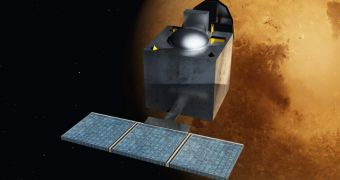Officials with the Indian Space Research Organization (ISRO) announced recently that their Mars Orbiter Mission (MOM) spacecraft has successfully passed the halfway mark on its journey to the Red Planet, which is expected to take a total of 11 months. The car-sized probe was launched into space on November 5, 2013, from the First Launch Pad (FLP) at the Satish Dhawan Space Center.
“The spacecraft crossed the half-way mark Wednesday [April 9] at 9:50am [local time] on its journey to Mars. The spacecraft and its five scientific instruments are in good health,” ISRO officials said in a statement released from Bangalore yesterday. MOM is designed to explore surface features on the Red Planet, as well as study aspects related to Martian mineralogy, morphology, and atmospheric traits.
Additionally, the probe will look for any signs of methane in the Martian atmosphere. The Red Planet is known to have some extra CH4 in its atmosphere, and missions such as MOM and the ExoMars Trace Gas Orbiter (TGO), which will be launched by the European Space Agency and the Russian Federal Space Agency soon, will seek to determine where this gas comes from, Mars Daily reports.
The Indian orbiter, called Mangalyaan, is the country's first attempt at interplanetary travel. Statistically, around half of all missions launched towards Mars have ended in failure, including several NASA-led science campaigns. China's Martian mission failed in 2011 as well, several years after the Japan Aerospace Exploration Agency (JAXA) failed to enter Martian orbit back in 2003.

 14 DAY TRIAL //
14 DAY TRIAL //